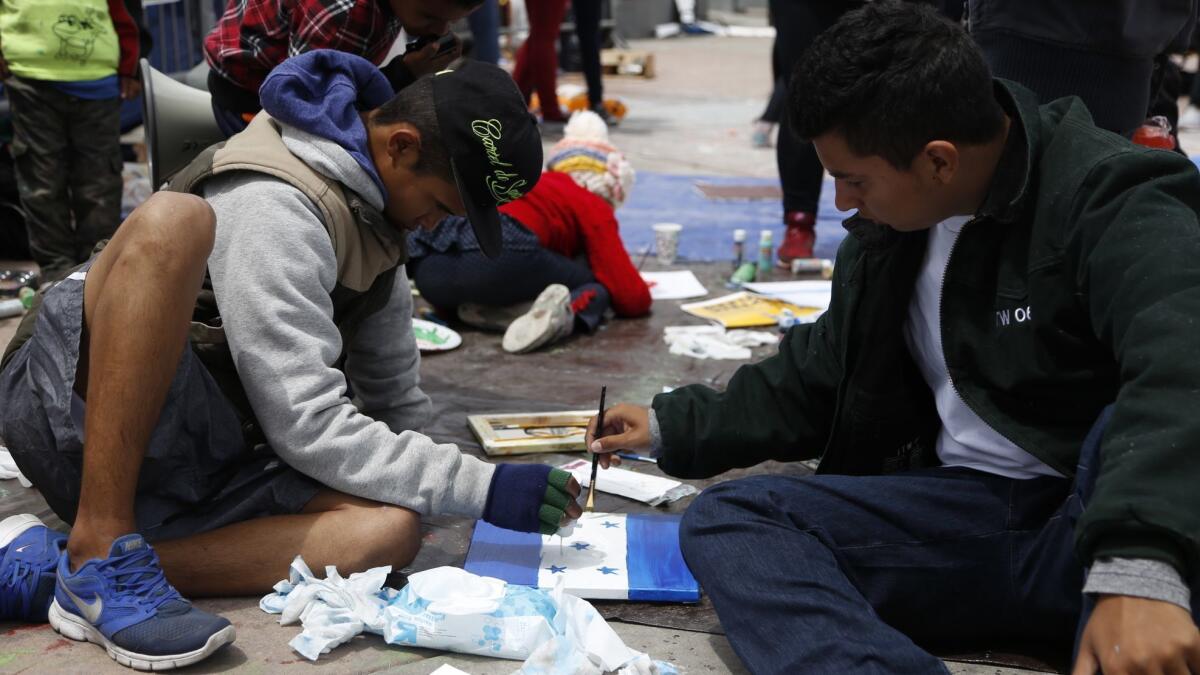About a third of caravan migrants enter U.S., but ‘we won’t be happy until the last one of us gets through’

- Share via
Spirits were high Wednesday as more members of the Central American caravan — about one-third of the roughly 150 who made the trek — entered the United States.
But as their monthlong journey to the United States comes to an end, those seeking asylum are preparing for a different kind of journey: one through the U.S. immigration system.
“Our trip isn’t over,” said Jose Coello, 17, of Honduras, as he walked into the U.S. from Tijuana. “This is just the next step.”
During an asylum process that takes months, even years, to complete, immigrants from the caravan can expect interviews and screenings by multiple federal agencies, stints in private detention centers and complicated legal arguments without the help of a lawyer.
Caravan members have said they won’t rest until every single one of them is in the U.S. Pueblo Sin Fronteras caravan leaders plan to go further, by having members of their legal team follow up with immigrants in the States.
“We are committed to standing with them as best we can,” said organizer Leo Olsen.
Early Wednesday, Pueblo Sin Fronteras leaders gathered in the middle of their makeshift tent city to call out the latest names of asylum-seekers with the help of a loudspeaker as they huddled under an umbrella to shield them from morning showers.
Dozens of immigrants surrounded Alex Mensing, one of the organizers, as he called out each name. Some ran up to the middle of the encampment in excitement, shouting, “Yes, that’s me.”
The chosen were given five minutes to gather their belongings and head into the San Ysidro Port of Entry for processing. All planned to claim asylum.
Among them was Katerina Enamorado, a 22-year-old from Honduras traveling with her 1-year-old daughter. Enamorado was feeding her child when her name was called. She was so excited that she ran to Mensing without putting on her shoes and still holding her child’s baby food.
“I’m so tired, but I’m even more excited,” she said while packing her belongings. “I hope to work and give my daughter a better life.”
Coello was serving food to other immigrants when his name was called. It took him a few seconds to realize it meant he was moving on.
The teen joined the caravan at the Guatemalan border. During the trip, members of the caravan had become a family, he said.
“This is something beautiful, unforgettable,” he said. “We are a family, and we won’t be happy until the last one of us gets through.”
But they also know the process is just beginning. Statistics show that people from El Salvador, Honduras and Guatemala have higher asylum denial rates than those of other counties. Not having an attorney stacks the odds against them even more.
Unlike criminal court, immigration court does not guarantee people the right to an attorney. Those who cannot afford a lawyer or are unable to find pro-bono representation have to make their own case before an immigration judge.
Caravan members likely will spend time in one of three Southern California immigration detention centers.
Generally, asylum-seekers spend most, if not all, of their time in facilities run by private prison companies contracted with Immigration and Customs Enforcement.
People who present themselves at the border in San Diego often go to Otay Mesa Detention Center. If there is no room, they are transported to the Adelanto ICE Processing Center, the Imperial Regional Detention Facility or even further.
There also are temporary holding facilities that immigrants from the caravan call the “ice box” because of how cold it can get inside.
Solis and Hernandez write for the San Diego Union-Tribune.
david.hernandez@utsandiego.com
More to Read
Sign up for Essential California
The most important California stories and recommendations in your inbox every morning.
You may occasionally receive promotional content from the Los Angeles Times.













